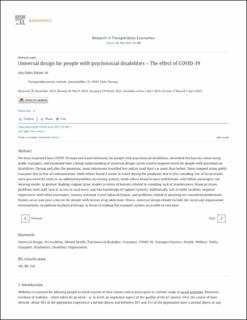| dc.contributor.author | Nielsen, Anja Fleten | |
| dc.coverage.spatial | Norway, Oslo | en_US |
| dc.date.accessioned | 2023-06-29T10:27:51Z | |
| dc.date.available | 2023-06-29T10:27:51Z | |
| dc.date.created | 2023-04-11T16:03:57Z | |
| dc.date.issued | 2023-04-03 | |
| dc.identifier.citation | Research in Transportation Economics. 2023, 98 (May 2023), 1-10. | en_US |
| dc.identifier.issn | 0739-8859 | |
| dc.identifier.uri | https://hdl.handle.net/11250/3074328 | |
| dc.description | Anja Fleten Nielsen, Universal design for people with psychosocial disabilities – The effect of COVID-19, Research in Transportation Economics, Volume 98, 2023, 101280, ISSN 0739-8859, https://doi.org/10.1016/j.retrec.2023.101280. | en_US |
| dc.description.abstract | We have examined how COVID-19 impacted travel behaviour for people with psychosocial disabilities, identified key barriers when using public transport, and examined how a broad understanding of universal design can be used to improve travel for people with psychosocial disabilities. During and after the pandemic, most informants travelled less and/or used their car more than before. Some stopped using public transport due to fear of contamination, while others found it easier to travel during the pandemic due to less crowding. Use of facial masks were perceived by some as an additional problem increasing anxiety, while others found it more problematic with fellow passengers not wearing masks. In general, findings support prior studies in terms of barriers related to crowding, lack of seamlessness, financial issues, problems with staff, lack of access in rural areas, and low knowledge of support systems. Additionally, lack of toilet facilities, negative experiences with other passengers, sensory overload, travel-induced fatigue, and problems related to planning are considered problematic. Station areas may pose a barrier for people with former drug addictions. Hence, universal design should include the social and organisation environments, in addition to physical design, in terms of making the transport system accessible to everyone. | en_US |
| dc.language.iso | eng | en_US |
| dc.publisher | Elsevier | en_US |
| dc.rights | Navngivelse 4.0 Internasjonal | * |
| dc.rights.uri | http://creativecommons.org/licenses/by/4.0/deed.no | * |
| dc.subject | Universal design | en_US |
| dc.subject | Accessibility | en_US |
| dc.subject | Mental health | en_US |
| dc.subject | Psychosocial disability | en_US |
| dc.subject | Transport | en_US |
| dc.subject | COVID-19 | en_US |
| dc.subject | Transport barriers | en_US |
| dc.subject | Health | en_US |
| dc.subject | Welfare | en_US |
| dc.subject | Public transport | en_US |
| dc.subject | Disabilities | en_US |
| dc.subject | Disability | en_US |
| dc.subject | Impairments | en_US |
| dc.title | Universal design for people with psychosocial disabilities – The effect of COVID-19 | en_US |
| dc.title.alternative | Universal design for people with psychosocial disabilities – The effect of COVID-19 | en_US |
| dc.type | Journal article | en_US |
| dc.type | Peer reviewed | en_US |
| dc.rights.holder | © 2023 The Author. Published by Elsevier Ltd. | en_US |
| dc.source.articlenumber | 101280 | en_US |
| dc.description.version | publishedVersion | en_US |
| cristin.ispublished | true | |
| cristin.fulltext | original | |
| cristin.qualitycode | 1 | |
| dc.identifier.doi | 10.1016/j.retrec.2023.101280 | |
| dc.identifier.cristin | 2140077 | |
| dc.source.journal | Research in Transportation Economics | en_US |
| dc.source.volume | 98 | en_US |
| dc.source.issue | May 2023 | en_US |
| dc.source.pagenumber | 1-10 | en_US |
| dc.relation.project | Barne-, ungdoms og familiedirektoratet (Bufdir): Grant Universal Design 2021 | en_US |

